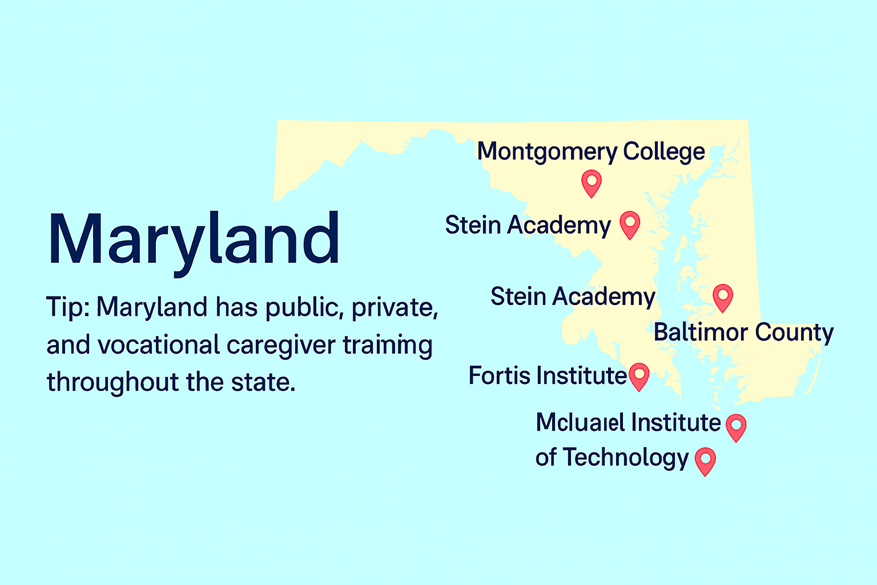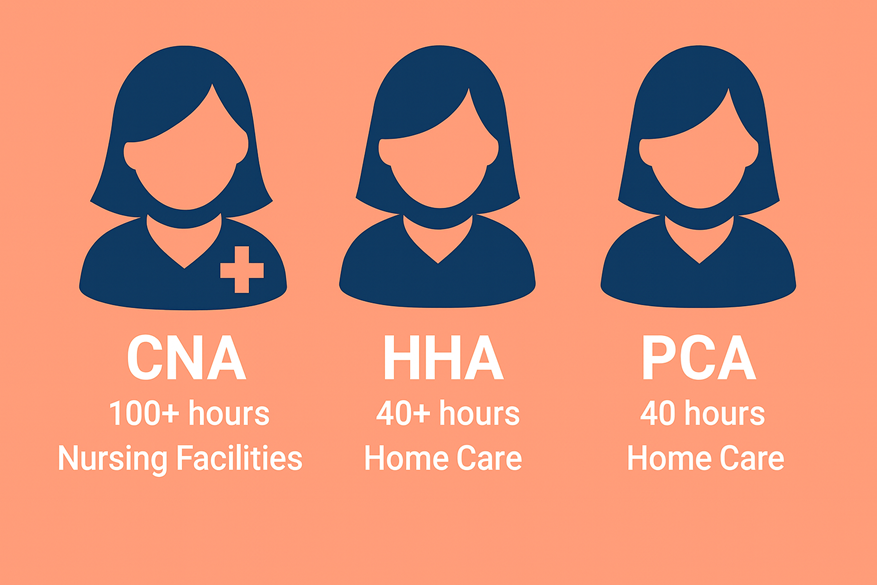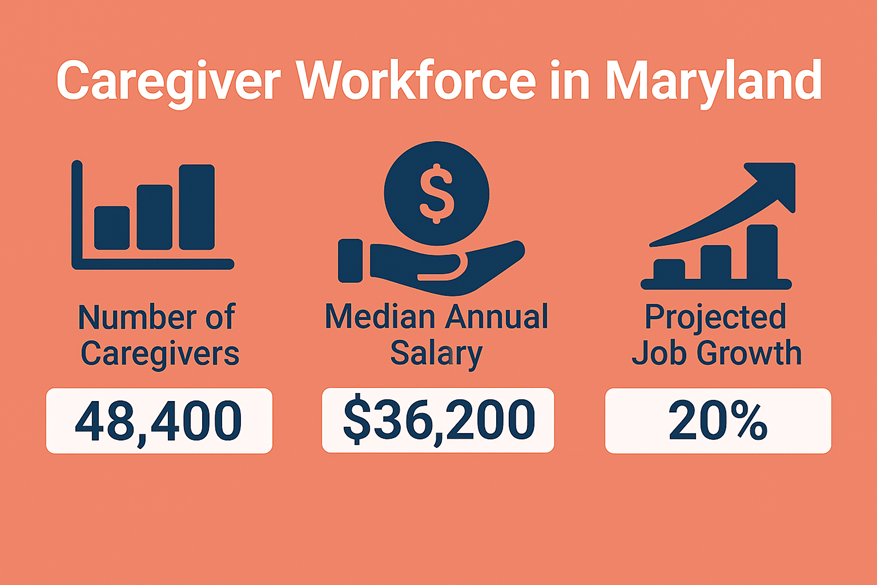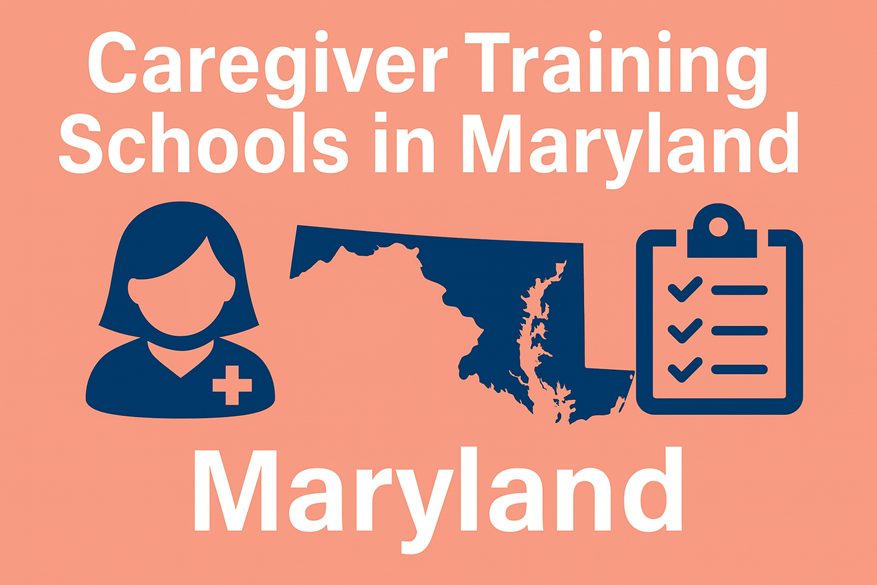If you’re thinking about becoming a Certified Nursing Assistant (CNA) or a Home Health Aide (HHA) in Maryland, you’re not alone. Caregiving is a deeply meaningful career—and Maryland offers plenty of training options to help you get started. Whether you’re switching careers or stepping into your very first healthcare job, there’s a path here for you. This guide breaks it all down clearly so you can feel confident as you take your first steps into the caregiving field.
Training Paths for CNAs and HHAs in Maryland

There are two main routes to get caregiver training in Maryland: through public or private colleges, and through vocational or career schools. Both offer quality education, and your choice may depend on things like location, schedule flexibility, and tuition costs.
Public & Private Colleges in Maryland
Many community colleges and private institutions in Maryland offer CNA training programs. These schools typically have structured schedules, experienced instructors, and access to clinical practice in local healthcare facilities. Some also offer HHA add-ons or bridge programs. Expect coursework in basic nursing skills, patient care, infection control, and communication.
Examples include:
- Montgomery College in Rockville, which offers one of the more comprehensive CNA prep courses in the state.
- Community College of Baltimore County (CCBC) with campuses in Essex, Dundalk, and Catonsville.
- Hagerstown Community College serving Western Maryland students.
These schools may also help with exam prep and job placement once you finish your program.
Vocational & Career Schools in Maryland
Vocational schools often offer more flexible training options, including weekend or evening classes. These are great for students who are working full-time or need a faster track into the job market. Many focus specifically on healthcare careers, offering hands-on training, state exam prep, and even externship opportunities.
You’ll find these types of programs across cities like Baltimore, Silver Spring, and Laurel, offered by schools like:
- Stein Academy in Baltimore
- Top Knowledge Healthcare Institute
- Fortis Institute in Towson
These schools are typically a bit smaller but often more specialized in caregiver training.
Public & Private Colleges with CNA/HHA Programs in Maryland
Vocational & Career Schools with Caregiver Training in Maryland
CNA vs HHA in Maryland: What’s the Difference?

If you’re wondering whether to become a CNA or HHA, it helps to understand what each role looks like in Maryland.
Certified Nursing Assistants (CNAs):
- CNAs in Maryland must complete a state-approved program and pass both written and skills exams.
- Training programs must include at least 100 hours, including clinical experience.
- Once certified, CNAs are listed on the Maryland CNA Registry and can work in nursing homes, hospitals, and long-term care facilities.
- Tasks often include taking vitals, helping with bathing and feeding, moving patients, and reporting health concerns to nurses.
Home Health Aides (HHAs):
- HHAs often work in private homes, assisting clients with personal care, light housekeeping, and medication reminders.
- In Maryland, HHAs must first become certified as CNAs, then complete additional HHA training—often around 40 hours.
- After completing HHA training, aides must be listed on the Maryland HHA Registry (a subset of the CNA registry).
- HHAs often work through licensed home health agencies rather than directly with families.
In short, CNA is your base certification. Once you’re a CNA, becoming an HHA is just a few steps away.
CNA and HHA Licensing & Certification Steps in Maryland
Here’s a step-by-step breakdown to help you understand the certification process.
For CNAs:
- Complete a State-Approved Training Program: Minimum of 100 hours, including clinicals.
- Pass the NNAAP Exam: This includes a written and practical skills test.
- Apply to the Maryland Board of Nursing (MBON): You must submit fingerprints and a background check.
- Get Listed on the Maryland CNA Registry: Once approved, you’ll receive your official certification.
For HHAs:
- First become a CNA (as listed above).
- Complete additional HHA training approved by the Maryland Board of Nursing (usually 40+ hours).
- Ensure your HHA certification is updated on the registry.
Renewals for both certifications are required every two years. Maryland also requires ongoing work hours or continuing education for renewal eligibility.
What About PCAs in Maryland?
While CNAs and HHAs are the most formally recognized caregiver roles in Maryland, Personal Care Assistants (PCAs) also play an important part—especially in home care settings. Unlike CNAs and HHAs, PCAs are not licensed or certified by the Maryland Board of Nursing. However, many home care agencies hire PCAs to provide essential, non-medical support for seniors and people with disabilities.
Typical PCA Duties:
- Helping with bathing, dressing, and grooming
- Assisting with walking and mobility
- Preparing meals and feeding assistance
- Light housekeeping and laundry
- Companionship and supervision
Training & Requirements:
There’s no state-mandated certification for PCAs in Maryland, but most employers require:
- Around 40 hours of basic caregiver training
- A background check and TB test
- CPR/First Aid training (often provided by the agency)
Some vocational schools and caregiver academies in Maryland also offer PCA or Companion Care programs, especially for those planning to work through Medicaid waiver services or private-duty care.
Where PCAs Work:
- In-home care through agencies
- Medicaid waiver programs
- Private pay caregiving roles
If you’re looking for a quicker path into caregiving, becoming a PCA can be a great entry point. Many PCAs go on to earn CNA or HHA credentials later to access more job options and higher pay.
Job Market for Caregivers in Maryland (As of August 2025)

The need for trained caregivers continues to grow in Maryland, especially with its aging population. According to recent data:
- Average CNA Salary: $37,800 per year ($18.15 per hour)
- Average HHA Salary: $34,200 per year ($16.44 per hour)
- Top metro areas for hiring: Baltimore, Silver Spring, Rockville, and Hagerstown
- Job Outlook: The Maryland Department of Labor predicts a 15 percent increase in demand for CNAs and HHAs over the next five years.
Long-term care facilities, home health agencies, and private clients are all actively hiring. Many employers also offer bonuses, shift differentials, and tuition reimbursement.
Ready to Start Your Caregiver Journey?
If you’ve been thinking about getting into caregiving, Maryland is a great place to begin. The state has strong training programs, solid job demand, and lots of support systems in place. Whether you want to work in a hospital or prefer visiting clients in their homes, becoming a CNA or HHA gives you the tools to make a real difference in someone’s life.
So take the next step. Explore your local colleges or vocational programs. Talk to a school counselor. Pick a timeline that works for you—and get started. The sooner you train, the sooner you can help.
Quick Reminder
While we’ve worked hard to make sure all the information here is up-to-date, caregiver certification requirements, tuition costs, and job data can change. Always double-check with your chosen school and the Maryland Board of Nursing before applying.
Sources
- Maryland Board of Nursing (MBON): https://mbon.maryland.gov
- Maryland CNA Registry: https://mbon.maryland.gov/Pages/cna-info.aspx
- Maryland HHA Registry: https://mbon.maryland.gov/Pages/hha-info.aspx
- U.S. Bureau of Labor Statistics (BLS): https://www.bls.gov/oes
- Maryland Department of Labor: https://www.dllr.state.md.us
- NNAAP CNA Testing: https://www.prometric.com/nurseaide/md
- College Program Listings: Montgomery College, CCBC, PGCC, Allegany College

